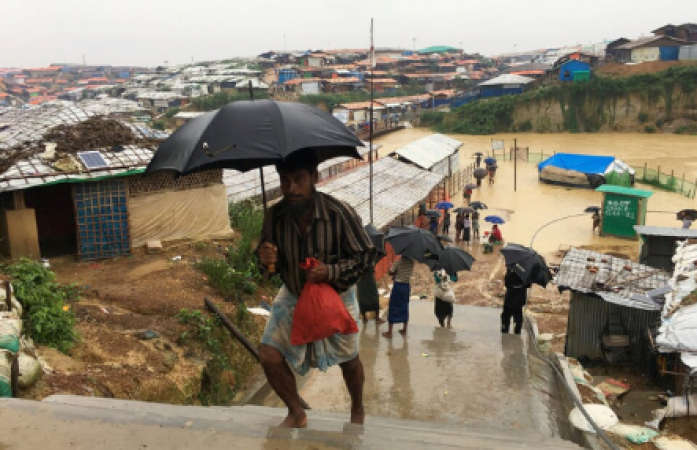
Dhaka: On Friday, the area braced for a strong cyclone with winds of up to 175 kph, posing a danger to the more than 1 million Rohingya housed in camps at the site. As a result, emergency preparations were under way at the largest refugee settlement in the world, which is located in southern Bangladesh.
In the Bay of Bengal, Cyclone Mocha was intensifying and headed towards Bangladesh's Cox's Bazar district, which had been housing Rohingya Muslims who had fled neighbouring Myanmar during a military crackdown in 2017.
The majority of the refugees are housed in improvised bamboo and tarpaulin huts in the hilly area, which are susceptible to landslides, strong winds, and rain.
Azizur Rahman, director of the Bangladesh Meteorological Department, told Arab News that Cyclone Mocha had intensified into a "very severe cyclone" on Friday morning and was on track to make landfall in Cox's Bazar at noon on Sunday.
"Cox's Bazar is at a very vulnerable point... the highest wind speed will reach up to 175 kph during the landfall. Mocha is similar to Cyclone Sidr in intensity, according to Rahman.
One of Bangladesh's worst natural disasters, Sidr, struck the country in November 2007. According to the Red Crescent Society, up to 15,000 people may have perished when it made landfall.
Cyclone Mocha has developed what is known as the "eye" of the storm, a central area with lighter winds, and is starting to resemble Cyclone Sidr. It is frequently observed that tropical cyclones rapidly intensify as the eye area develops.
Also Read: China will dispatch a special envoy to the Ukraine, Russia, and other European countries
High tides, which the Met warned could reach two metres or even more if the cyclone coincides with regular waves, also posed a threat as the storm approached the coast.
There is a chance for higher tides of up to 12 feet, according to Rahman.
At 3 p.m., "normal tidal waves begin, and in this case, Mocha will coincide with normal tidal waves."
According to Mizanur Rahman, the commissioner for refugee relief and repatriation, there were no immediate plans for a mass exodus from Cox's Bazar, but 3,400 volunteers had been organised for emergency response and local community centres and schools had been transformed into temporary shelters.
"We've taken enough precautions to protect the Rohingya from Cyclone Mocha. If necessary, Rohingya who reside in landslide-prone areas will be moved to safer locations. There will be a control room to handle emergencies in each of the camps. Our mobile medical teams are ready, he declared.
To ensure an alternative power supply in the event of a disaster, "all health partners have made preparations and stored fuel."